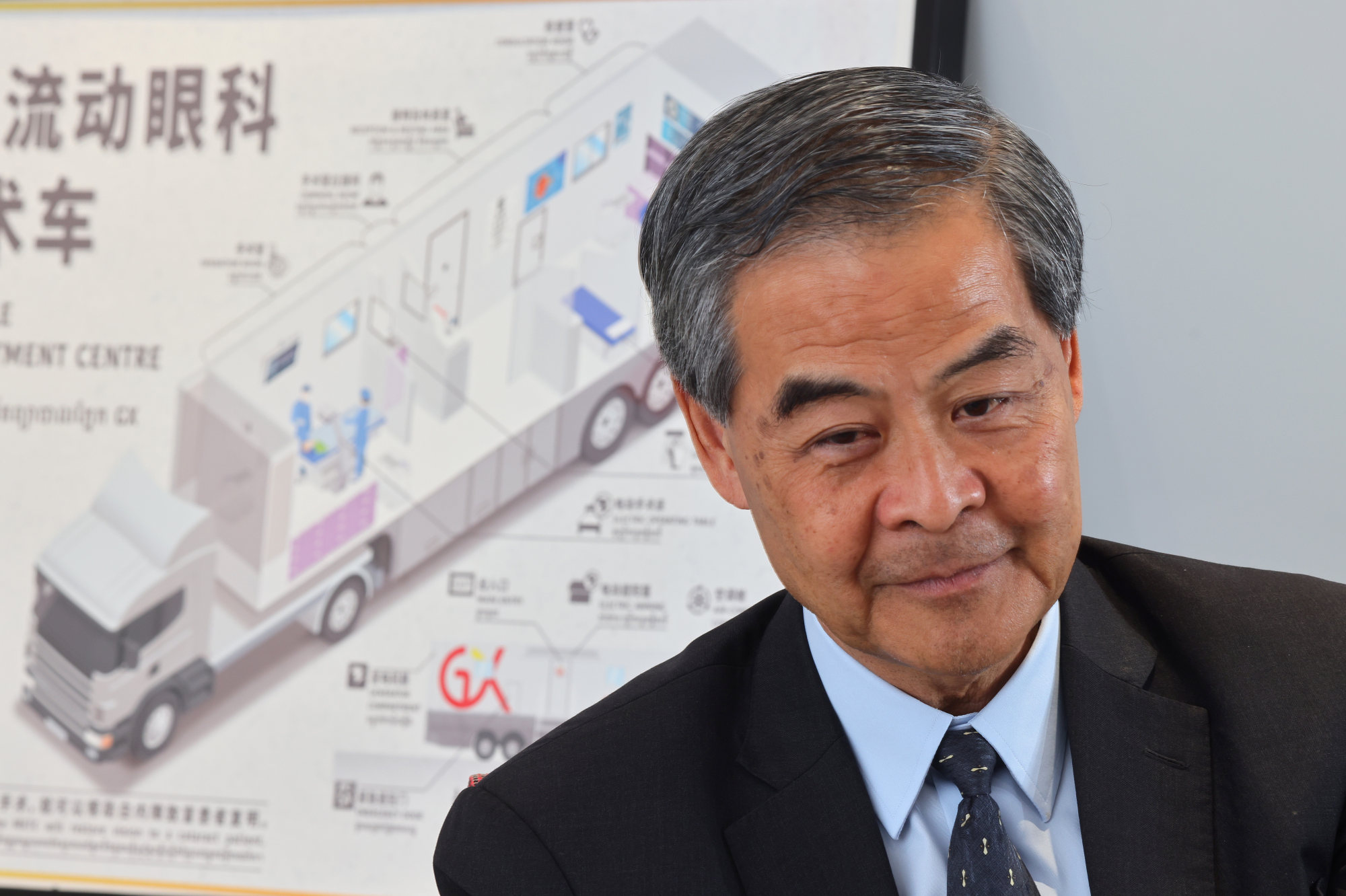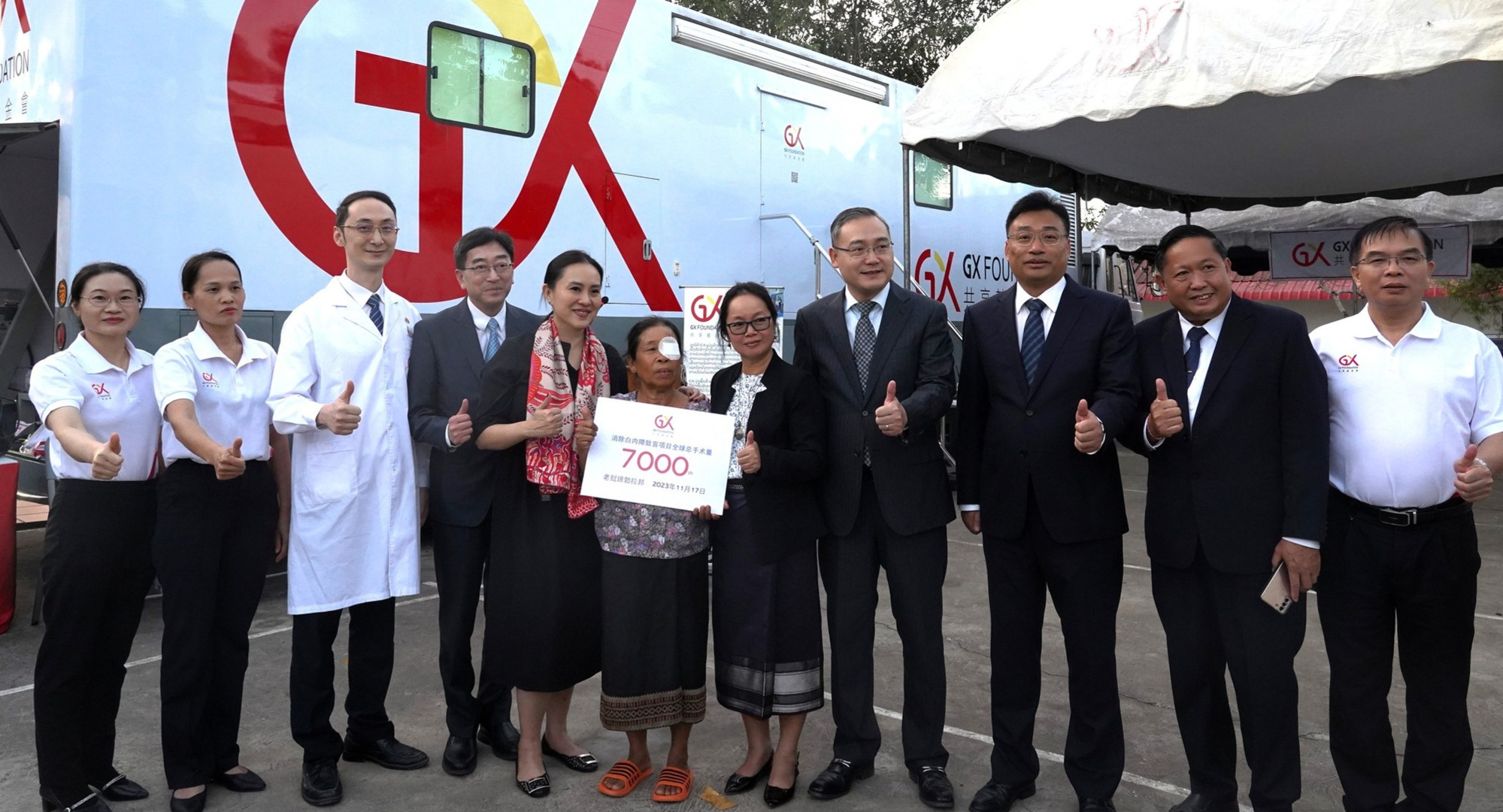
Exclusive | Non-government charity work in belt and road countries easier as opposition won’t play politics, says CY Leung from his own NGO’s experience doing eye operations
- Former leader Leung Chun-ying reveals foundation he chairs ‘overwhelmed’ by city students wanting to volunteer for public health work in belt and road countries
- Work by such non-profits has not been met with misgivings from those nations’ politicians, who otherwise often protest against foreign government efforts, he says
A former Hong Kong leader involved in non-governmental work has said doing volunteer projects in belt and road countries can be smoother when led by non-profit groups rather than the government as it can deter opposition players in such places from getting in the way.
In an exclusive interview with the Post, Leung Chun-ying also revealed that GX Foundation, an organisation he chairs that aims to undertake public health missions in countries spanning Beijing’s Belt and Road Initiative, had been “overwhelmed” by Hong Kong university students wanting to volunteer in its work.
The charity, with eight truck-towed mobile surgical units as well as mainland Chinese medical professionals, coordinators and volunteers from Hong Kong, has pledged to perform 37,500 free cataract operations in Laos, Cambodia, Djibouti, Senegal and Mauritania before 2027.

Even though the foundation’s board comprises mostly representatives from Chinese state-owned enterprises, Leung said their work had not been met with misgivings from local politicians, who would otherwise often protest against efforts spearheaded by foreign government agencies.
“There’s a distinction between the government doing it and an NGO doing it,” Leung said.
“Being the opposition [in the other countries], [they’d] ... say, ‘hey, the Hong Kong government or the Chinese government is doing this for political purposes’.”
“We don’t talk politics,” said Leung, who is also a vice-chairman of the Chinese People’s Political Consultative Conference, the nation’s top political advisory body. “We don’t want anything bad. We don’t look to signing a trade treaty with the host country. And we’re there just for humanitarian purposes. Much easier.”
Mainland help key to providing 7,300 free cataract operations: Hong Kong charity
GX Foundation marked its fifth anniversary recently and is one of the few known Hong Kong-based NGOs serving the belt and road countries. It joins mainland-based groups such as China Foundation for Poverty Alleviation and other smaller mainland NGOs that have set up international projects in the belt and road countries.
He said GX Foundation still counted on the relevant local Chinese embassies for essential support, but Chinese businesses and individuals had played vital roles in providing hands-on advice and rendering timely assistance to lift the medical teams out of crises.
All medical staff were from the mainland, but other volunteers, including coordinators and translators, were mainly young people from the city, Leung said, adding that they had been “overwhelmed” by requests from university students to join either on a full-time basis or as interns.
Hong Kong can fulfil President Xi Jinping’s vision for belt and road plan: Paul Chan
“And if you look at our young staff members up there, you wouldn’t imagine Hong Kong young people, particularly girls, who would actually take on such challenges,” he said.
“They’re out there for a month or sometimes months, and a lot of unforeseeable challenges, whether it’s earthquakes or daily supplies, and there is loss of internet connection.”
GX, which takes its acronym from the Chinese phrase “gong xiang” or “sharing together”, has completed more than 7,300 operations since on-site efforts began a year ago.
Leung said the most exciting and rewarding moments were when patients regained their sight and were able to see their families again. Scenes of villagers hugging the charity’s team members, he said, also “spoke volumes about people-to-people connectivity”.

Such occasions illustrated one of the goals set for Beijing’s Belt and Road initiative, which was to call on the participating countries to plan, build and benefit together, he said.
He added it was important to spread the word about the foundation’s accomplishments to show the world that China was capable of fulfilling its promise of “benefiting together”.
GX Foundation is spending about HK$100 million (US$12.8 million) a year and Leung assured that the funds raised from big donors would sustain their efforts going forward. Nevertheless, the charity was still planning to launch public fundraising to reinforce the people-to-people connection aspect of its work.
Hong Kong, Beijing pledge 15 billion yuan for belt and road investment platform
“The yields from these campaigns are not huge, but we’d like to get the people involved,” he said. “What we would like to say at some stage is that the money that we use to help people in the various countries actually comes from the lai see packets of young children, that kind of stories.”
Leung said looking forward, his plan was to build the foundation into a “flagship” charitable organisation of China with an overseas focus, and it was currently working on future expansion plans, including a second-stage expansion of their scope of service.
“We’re young,” he said. “We’re small. But the message is getting out, albeit in a small way – we are doing our best to help local people [in other countries]. And Hong Kong doing it, as part of China, tells a good Hong Kong story.”

